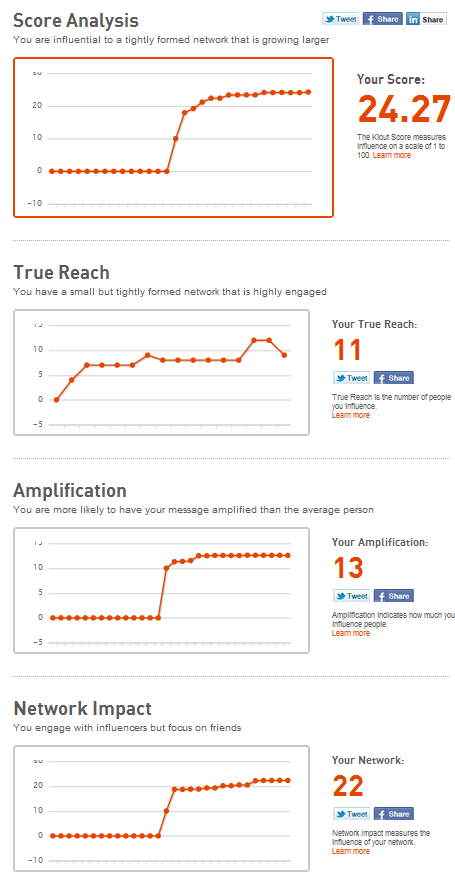 If you’re reading this article, it should be clear to you that people use social media — like this very blog post — as a way to broadcast their thoughts and feelings, be them positive or negative. Blogs can also convey information, share ideas, and chronicle important lifetime milestones. In today’s day and age, it is incredibly easy for a person to set up his personal web space to start sharing whatever is on his mind (and you begin to wonder why Twitter’s growth is so huge and popular among celebrities?)
If you’re reading this article, it should be clear to you that people use social media — like this very blog post — as a way to broadcast their thoughts and feelings, be them positive or negative. Blogs can also convey information, share ideas, and chronicle important lifetime milestones. In today’s day and age, it is incredibly easy for a person to set up his personal web space to start sharing whatever is on his mind (and you begin to wonder why Twitter’s growth is so huge and popular among celebrities?)
With social media — or quite frankly, the existence of the Internet, any misstep you make in your personal dealings with others can become public. And this is why customer service is incredibly important, even if the customer service dealings are entirely handled offline.
Social media is social.
It’s easy for people to tweet about bank robberies and to photograph live displays of computer errors in public places. Do you think it’s harder for people to rant about your screw-ups?
Social media, quite simply, relates to the usage of content created by easily accessible publishing technologies (social media sites such as Facebook or Twitter, photo publishing sites such as Flickr, video sites like YouTube and Vimeo) that is generated by the hundreds of millions of consumers utilizing these technologies. As alluded to in the previous paragraph, it’s so easy for people to say something using these services that can be detrimental to your business. And if they don’t have a blog? It’s easier for them to tell someone else who could make it a public crusade for reform.
Customer service is social, too.
Situations like this appall me. In the linked-to article, Consumerist shares the story of an individual who opted to use a landscaping service to trim his lawn. Since he was reasonably happy with the service provider, he referred it to his friend. Only when the landscaping company mowed down the guy’s vegetable garden and did not rectify the situation seven weeks later did the guy decide to make a public spectacle of the situation. He brought the incident to Consumerist’s attention and then even transcribed, verbatim, the verbal threats he received from the company owner over his phone’s voicemail.
Sure, there are probably a few things you can point out that should work in the company’s favor. After all, you’re reading one side of the story, and the owner of the company admits that this is a misstep in the guy’s logic. However, the damage is done when a company’s customer service does not actually perform the service and refuses to right its wrongs. Despite not knowing the other side of the story, as a reader, I gleaned a few things: nearly two months have passed since the company wronged its client, the owner of the company was not apologetic, and not one but two customers were affected as a result.
If you’re reading this article, even if you did know the other side of the story, would you want to do business with this company? Does the company owner appear to be a guy you’d want to have dealing with? (Heck, are you even interested at this point to know the other side of the story? Clearly, there was no communication done there since two clients are left speechless.)
In a post made by Seth Godin, he writes:
My rule of thumb is this: every person you turn away because your product or service isn’t right for them turns into three great customers down the road. Every bad sale costs you five.
Here’s some more food for thought: Every blog post or negative review costs you thousands of customers.
This is exactly why your customer service representatives need to do a perfect job or none at all. Everything today can be turned into a public spectacle that can make or break you. We have embarassing pictures in Google Maps, videos about the death of an innocent man in the hands of a “competent” cop, and even Yelp reviews that can damage your personal reputation, never mind your business.
It’s evident that if you want to maintain your clients, you need to really make the effort to keep them. We’re starting to use search — and social media — as our recommendation engines. We trust what our peers or others say about the services being offered by providers and choose whether or not to proceed on the basis of what people are saying.
If you value your company’s survival, it is imperative that you educate those who respond on your company’s behalf to bear in mind that people are publicizing their interactions. Sure, you may not necessarily be in the greatest mood, and we all have those days, but that split second when you say something awful could really hurt the chances of growth for your business in the long run. How many people really want that?
Even if your product is terrific, if your service is horrible, don’t expect your customers to stay. We can learn a thing or two from the landscaping company and AT&T’s failures with the iPhone. If someone isn’t happy with the way you’re treating them, they’ll go somewhere else. Some will go the extra mile to share with their friends exactly why they’re moving on, too, so don’t make any missteps that will cost you business down the road.
I am a huge advocate of stellar customer service. I try to answer all emails within minutes of receipt — even at odd hours of the day — and I try to go above and beyond to provide the most informative responses that I can. Even if I’m in a sour mood, I still try to end my emails with a smile. Why do I do this? Because even if I don’t know the person (yet!), I still care about the people I am dealing with and the relationships to be forged, and I don’t want them to be disappointed in the lack of attention. When an email is genuine and personalized and someone has taken the time out to write it, would you really want to ignore it?
What’s the moral of the story? Your reputation is always on the line, and if you commit any type of blunder, albeit a small one, don’t expect to be off the hook. Since it’s so easy for people to vent their frustrations, you could very well discover that you are the subject of their complaints.
(And if you are, I hope you have a disaster recovery system in place!)
Update: Ely Rosenstock has a different take on customer service.





We have already seen companies like Comcast take a real strong stance on customer service by using Twitter. I don’t they had much of a choice though.
In a way, Nick, they certainly could have. 🙂
Companies are still challenged with whether they *should* get involved in the conversation. Many people think that if they involve themselves once, they’re essentially sucked in forever. If they don’t respond to later concerns, are they in trouble?
Comcast did it early, and Frank Eliason today (who, by the way, is featured in the book I wrote) is really the role model for excellent customer service using online technologies.
That’s not to say it should only be done on Twitter though. Your regular in-person, email, and phone interactions are critical in this day and age or else someone can simply start ranting about your inadequate and poor treatment.
Even some companies that might not be trumpeting their use of SocMed are in there. I had a recent experience with AT&T that was resolved favorably because someone from AT&T in my area was on twitter. http://bit.ly/m8MdG
People are talking about your business, service or brand. So instead of sticking your fingers in your ears and ignoring it (at your own peril), better to engage with those people and make them feel “felt” and heard. Amazing how you can sway opinions…
Great post, Tamar, that covers all the points. The openness of the Internet has shifted the power. The power is now with the people. Those who think they have power because of their organizational position or their wealth will find that power is much less than it used to be. It’s almost like having a conscience. 🙂
Yeah i totally agree with u Barry .
Your book reflects this customer-centered approach and I found it quite helpful – so I wrote a review of it (your second as of now) on amazon. Kudos to you!
Tamar,
I agree with you 100%. Don’t you think, however, that the more consumers use social media for customer service, the more it floods the system? It’s important for companies to utilize social media but it doesn’t scale. EVERY person can’t be helped with every little problem via Twitter instantly. It’s like THE CLUB. When it was new, it deterred thieves form stealing your car. When enough people got it, the thieves developed a system to get through it in 10 seconds. The more that people use the service, the worse it was at doing its job.
In other words, do you think the one-to-one social media customer service that you’re talking about can scale?
It doesn’t scale now, nope. But the fact is that people bitch and moan about your business if you don’t address their concerns to their satisfaction (or at least make a solid effort to do so). If a company wants to have a stellar reputation today, they better think about giving good customer service.
The fact is that I’m not talking specifically about companies ignoring customers. I’m talking about when companies do a bad job, like when the landscaping company owner left a condescending message on his customer’s voicemail. I’ve made several product and service inquiries directed to customer service/support departments of companies in the past, and the fact is that sometimes they don’t respond. Of course, it doesn’t increase the chances that I’ll ever use their business again, but that’s all they mostly get from me. I’m not about to complain overtly — I save that for really awful support, which is really the point of this post.
I do think, however, that there should be a shift of personnel to the channels that are most trafficked. If you’re offering an online service, it’s best to have people manning the online sphere, not to have them sitting at telephones all day. And if you don’t have enough people, then you should staff up. If you have many customers, it is a cost you should be willing to invest in for what I believe is to be a positive ROI.
Good response. The onus is on the company to make the customer feel like they matter. The goal, if I understand you correctly, is not to help everyone, but to make everyone feel like they’re being helped (and hopefully helping some people in the process). It’s less about service and more about perception of service.
If that is what you mean, than I agree. I think social media customer service doesn’t scale and people who think that they will be helped quicker in the future because they can Twitter a company are not going to be happier 5 years from now. Social media customer service is a form of marketing…marketing the company as a friendly, customer-obsessed organization.
There may be individual stories about people getting their phone service back up quicker because of SM but that too is just more marketing dollars at work, not customer service dollars.
“It’s less about service and more about perception of service.”
Good way to put it. Yes, I do agree, but I do hope that it’s about actually giving the service where appropriate. If not, then showing that you care is a big important part of it. Let the customer feel valued even if you can’t help him. That’s a surefire way to maintain the relationship.
Right on. A business should make its customers feel at home and could even use YouTube and other online video sites like Vimeo and AdWido to promote a positive image.
No matter what network or medium you use, customer service should be a top priority. If you are trying to sell a product, your customers are your business and it is your responsibility to provide them good customer service or you will fail.
Social media marketing really provides your company with a face. Whether you are tweeting about something funny that happened at the office this morning or Facebook-ing about a new promotion you are doing on Tuesdays, people will start to feel like they know you and your company. This is invaluable. Our society is moving towards a more and more impersonal way of living. Instead of picking up the phone, we tend to text. Emails are preferred over hand written letters. Social media allows us an inside look at the companies we use everyday. If you follow the guys at zappos.com (@zappos) on twitter you will get a real sense of who they are. The company I work for (@gorocketfuel) likes to promote our work while showing our fun side through twitter and Facebook. Social media is a fantastic way to bring that neighborhood business charm back to a increasingly dispassionate world.
Some of the trends highlighted in this post are continuing to develop with more and more high street retailers not only establishing a presence on Twitter but using it for proactive customer service
Customer Service is often the last thing considered in any strategy when it should be the first. Thank you for putting that together Tamar in this article.
Great article – thanks for this.
Without customers we have no business do we? Do people get so wrapped up in winning new customers that they forget about ‘looking after them’?
I met a new client the other day who was stressing about winning more business, gaining more customers. On closer inspection, this client had over 14K customers on their database alone, and quite a substantial number on Facebook too. The clients attitude was that these particular customers knew all about his company because they had already made a purchase and was happy to just leave them ‘sitting there’ whilst he went out to discover more.
Customer service as we all know is not just about putting issues right, it’s about ‘before, during and after’ the sale and I think this client is a prime example of many companies out there who do not openly demonstrate the value of the customer.
A great experience breeds influence and positive feelings.
Customer service is not placed high up on some agendas – it should be first and foremost. Working out how to utilise customer opinions, needs, wants, preferences as well as how to deal with any negative issues should be in place before anything else, and certainly so if handling customers online.
I contacted the agency handling Justin Nozuka yesterday – fans were spammed for over 15 hrs with the same message both on Facbook and Twitter, with dates for a gig that had already happened and many were so cheesed off like me, that they hid his feed. Everytime they commented on his wall and complained, these comments were ‘auto liked’ which rubbed salt in the wounds. The agency emailed me back saying it was a technical glitch which they had now put right and posted a 2 sentence apology on his wall to fans. I would probably have tried to do a little more than this – he has around 120K fans across the 2 networks. What do you think?
Thanks for commenting, Lesley. It’s really important to keep your customers happy for the duration of their patronage, and you’re so right! Customers can disappear at any time.
As far as that message, oy… doesn’t sound too good for them!